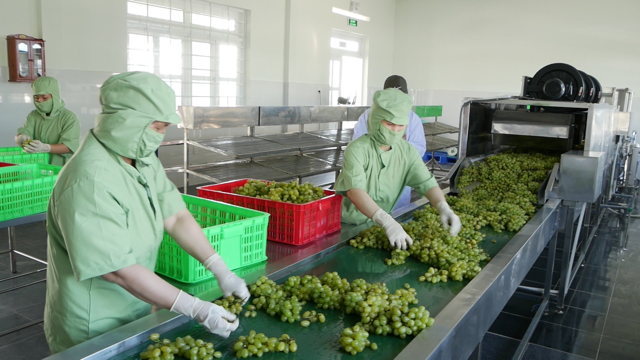 Society
Society

Co-operatives supported by the Việt Nam Cooperative Enterprise Development (VCED) project succeeded in connecting farmers to global value chains and increasing farmer incomes in the pandemic, said Brian Allemekinders, Head of Cooperation, Embassy of Canada to Việt Nam.

|
| Workers process grapes at Evergreen Ninh Thuận - a co-operative that receives support from the Việt Nam Cooperative Enterprise Development (VCED). — VNA/VNS Photo |
BẾN TRE — Co-operatives supported by the Việt Nam Cooperative Enterprise Development (VCED) project succeeded in connecting farmers to global value chains and increasing farmers' incomes in the pandemic, said Brian Allemekinders, Head of Cooperation, Embassy of Canada to Việt Nam.
Speaking at a workshop on the closure of the project on Thursday, he said that the success of the co-operatives helped validate the co-operative models to advance Canadian and Vietnamese mutual objectives such as inclusive growth, climate change and women’s economic empowerment.
Starting in 2015, the VCED project is funded by the Government of Canada through Global Affairs Canada and jointly implemented by SOCODEVI and the College of Management for Agriculture and Rural Development II.
The project’s ultimate goal is to help improve the livelihoods of farmers through the development of agricultural value chains in the new co-operative model.
The VCED project has a total investment of 12.9 million Canadian dollars from the Government of Canada and SOCODEVI.
Based in Quebec, SOCODEVI was created in 1985 from the desire of the local co-operative and mutualist network to put into practice one of the founding principles of cooperativism: inter-cooperation.
Since then, SOCODEVI has contributed to improving the living conditions of families in more than 40 developing countries by supporting the creation and strengthening of inclusive, autonomous, profitable, sustainable, and innovative co-operatives.
“Canada is pleased to support Việt Nam to develop the co-operative sector over the past two decades,” the ambassador said, emphasising that VCED was also an excellent example of how large-scale co-operatives using Canadian models and expertise could be tailored to the local context to support poverty reduction.
After seven years of implementation, the project has directly supported the livelihood improvement of more than 8,000 households, provided training for more than 500 young people on co-operatives and entrepreneurship, and created approximately 100 master trainers on the co-operative model.
Women have been empowered to effectively participate in and lead households, co-operatives, and community work.
At the macro level, the VCED project has provided significant policy advice to the Government of Việt Nam, including revising the Cooperative Law, the co-operative policy framework, and sharing experiences between Canadian experts and governmental officials.
Lê Đức Thịnh, General Director of Department of Economic Cooperation and Rural Development, Ministry of Agriculture and Rural Development, said that the project’s goals had been reached, and some even exceeded expectations.
He said that the project provided many lessons for Việt Nam in theoretical concepts, policy development, or practical piloting models of sustainable co-operative development.
“The VCED project has engaged in formulating the co-operative economic development strategy in Việt Nam, law amendment, decrees and circulars formulation. So, from MARD’s perspective, we are delighted and highly appreciate the project results,” Thịnh said.
Đặng Văn Thanh, Deputy Director of Cooperative Development Department, said that the project supported the department in almost all work for the development of co-operatives.
“With that collaboration, the project has helped to support and promote co-operative development in line with the socio-economic development of Việt Nam,” Thanh said.
The five new large-scale co-operatives under direct support from the VCED project are Bến Tre Green Pomelo, Evergreen Ninh Thuận, Đơn Dương Dairy, Evergrowth, and Thanh Bình Coop.
The project has successfully increased the co-operatives’ competitiveness in various aspects, including management capacity, branding, domestic and foreign market development, building/upgrading international standards facilities to complete the agricultural value chain of each co-operative.
These co-operatives have achieved success. For example, the number of members has grown strongly, or their domestic and export markets have expanded.
The member households have applied modern farming methods that are safe and meet VietGAP/GlobalGAP standards. And all of their factories meet international Hazard Analysis Critical Control Point standards.
Three co-operatives of Bến Tre Green Pomelo, Evergreen Ninh Thuận, and Thanh Bình dragon fruit co-operative have also been selected to participate in the Ministry of Planning and Investment’s Project 167 on “Selection, improvement, and replication of effective new-model co-operatives in localities across the country from 2021 to 2025.”
“The co-operatives supported by the VCED project, such as the Ben Tre Green Pomelo, are typical models we would love to replicate. They are not only active in production to meet various standards, but they are also proactive in expanding markets. Furthermore, they are moving towards a circular economy which ensures a closed production process that minimises environmental pollution,” said Trần Thành Nam, Deputy Minister of Agriculture and Rural Development.— VNS